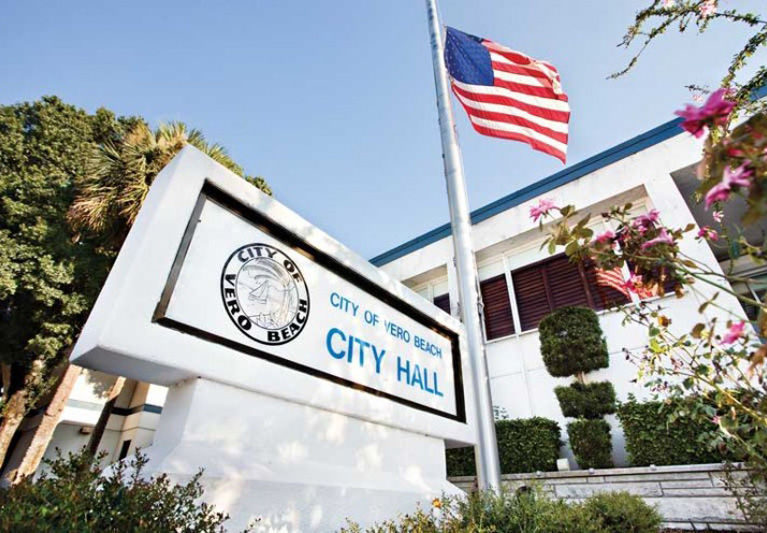
VERO BEACH — Taxpayers will never know how the vote would have turned out had Councilman Craig Fletcher been in attendance at Thursday’s Vero Beach City Council budget workshop, but with the four votes that were counted, the tax rate was capped the same as the current year.
Thursday’s session was the culmination of four days of budget talks that outlined the priorities of the city for operations in the short-term and for capital improvements over a five-year cycle.
“This budget is your policy statement,” said City Manager Jim O’Connor.
Councilwoman Amelia Graves made the motion to potentially raise about $200,000 more in taxes by setting a maximum property tax rate of $2.13 per 1,000 of taxable property value. Mayor Dick Winger, who emphasized throughout the four-day session that the city needs to double the $200,000 budgeted for street paving, seconded the motion.
Winger said he was also concerned about the lack of flexibility in the budget in case of a hurricane.
“We’re sailing too close to the wind. I personally would recommend a minor tax increase,” he said, to ensure the city had adequate reserves, come what may. Winger is a strong advocate of maintaining city facilities and aesthetics and of giving the city staff the tools they need to manage the city.
Vice Mayor Jay Kramer and Councilwoman Pilar Turner — both potential candidates for re-election in November — voted against the measure, and City Attorney Wayne Coment clarified that in the instance of a 2-2 tie, the motion fails.
Turner has consistently worked to tamp down spending and to bring more accountability to the city for how it uses taxpayer dollars.
“When you increase revenue with a tax increase, it relieves pressure on government,” she said.
Kramer said he realized that the city benefits from having the money to do things like keep the streets paved as it keeps property values high. But on the other hand, he was not comfortable piling on an 8 percent tax rate increase on top of larger tax bills resulting from a rebound in real estate values this year.
“We have a 3 percent tax increase already,” he said.
Turner then made a motion to keep the tax rate 2.0336. Kramer seconded that motion and it passed 4-0.
That rate of $2.03 per 1,000 in taxable property value will bring in $4,278,471, or $164,604 more than $4,113,867 property owners paid this year.
Despite not raising the property tax rate, Vero is looking at the pros and cons of establishing a stormwater utility to fund projects designed to protect the Indian River Lagoon from potentially damaging stormwater runoff.
The city has a program for gradually installing baffle boxes to catch grass clippings and other nitrogen-producing debris before it ends up in the lagoon, but charging residents $60 per year via a stormwater utility would speed up the completion of those projects.
Winger said he was certain residents would pay a stormwater fee if they knew it would be helping the lagoon. Kramer said the matter should be put to the voters.
“It’s a perfect referendum question,” Kramer said. “If they reject it, fine. Then we move on.”
One option the council did not consider was adopting the “roll-back” rate, which would assess the same dollar amount in taxes as the current year, would have been $1.97 per $1,000 of taxable value. That rate was not offered up as a viable option, as the city is facing a 16 percent increase in pension costs in the coming year, plus more expensive health premiums and the recurring cost of 3 percent employee raises which took effect March 1.
Vero has $37 million in unfunded — some use the slightly more benign term “under”funded —pension liabilities, plus $14 million in unfunded liabilities for benefits paid to employees after retirement from the city. The Vero Beach general employee pension fund is only 62 percent funded, so it sucks up about $4.3 million annually, slightly more than all the property taxes collected put together.
Vero funds these liabilities via more than $8 million in direct and administrative transfers from the electric, water and sewer utilities. The police pension fund is in better shape than the general employee pension fund.
Each year, there is talk of reducing the city’s dependence on these revenues from its utility customers, but so far it’s only been talk. In fact, direct transfers from the electric utility are set to increase by $128,000 in the coming year and administrative transfers will go up by $114, 571 — that’s nearly a quarter million dollars more being siphoned off the electric utility into the general fund in the coming year. Sixty-one percent of the electric ratepayers who subsidize the general fund live outside the city limits.
As part of the budget process, the city eliminated nine positions in the electric and water-sewer utilities for the coming year, but after expanding one position in the City Clerk’s office and one in the warehouse, total staffing will be reduced by a net of seven positions.
Vero will hold two public hearings on the budget, at 5:10 p.m. on Sept. 3 and again at 5:10 p.m. on Sept 16. The new budget year begins Oct. 1.



